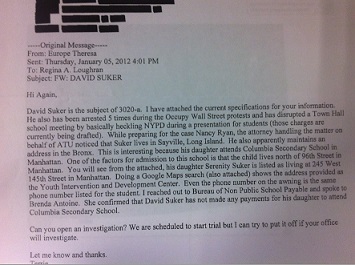|
Government Lies, Corruption and Mismanagement

The New York City Rubber Room Anti-Teacher Charging Process Shows How Corrupt the Carmen Farina-Bill De Blasio Department of Education Really Is. by Betsy Combier
From the first time that I was invited into the rubber room at 25 Chapel Street in 2003 by David Pakter, I understood that the charging, rubber room placement, and 3020-a hearing process - which I shortened to the "rubber rooms" process - was a massive fraud on the public. The problem stems from the fact that there is no accountability in this process, therefore anyone can charge someone with anything and make him/her guilty without having any repercussions for the charging agent's life or career.
From the first time that I was invited into the rubber room at 25 Chapel Street in 2003 by David Pakter, I understood that the charging, rubber room placement, and 3020-a hearing process - which I shortened to the "rubber room" process - was a massive fraud on the public. The problem stems from the fact that there is no accountability in this process, therefore anyone can charge someone with anything and make him/her guilty without having any repercussions for the charging agent's life or career (I call these agents "The Gotcha Squad"). See here and here.
The Arbitration for tenured teachers, called "3020-a disciplinary hearings" are not what they seem to be either. See the emails sent from the DOE and UFT to the Arbitrators, to see the chumminess going on. Speed is all that counts. Rights of the educator, charged with either incompetence or misconduct, are less important or not protected at all. UFT Attorney Carol Gerstl prohibited the 3-member arbitration panel in 2008, for the reason given, this would make the hearing process "faster". In New York City, an administrator who reassigns a teacher after claiming he/she is guilty of either valid or false charges is given the same rewards: financial, because the person is taken off of the school budget; personal, because the person is no longer in the same building and the "problems" this person supposedly caused are stopped; professional, because there may be some concerns about the principal's actions which the charged teacher could reveal, and now is out of the way, gone from the premises, and far from parents and other staff at the school. In sum, there are many rewards to putting a tenured teacher in a rubber room, and no consequences for making false charges against him/her. Truth be damned. Did you read Lord of the Flies and don't you see similarities? When you are not held accountable for your acts, and you dislike someone, then using public funds to hurt that person causes you no sweat. UNLESS the public or media care enough and post a story about the principal falsely accusing a tenured teacher of doing something wrong when nothing wrong was actually done. This is what happened in David Suker's case. I have written in several articles posted on this website and on my blog, saying that I was lucky to have been involved in holding the New York City Department of Education accountable for the outrageous attack on tenured teacher David Suker. Since 2003 I have been involved in hundreds of cases where tenured teachers were not allowed, by the Department OR BY THEIR OWN REPRESENTATIVE from the UFT or NYSUT, to defend him or herself. This is a terrible system and the NY State legislature should have stepped in years ago, and made accountability part of each step along the way. None exist. I cant help but think about the hundreds of thousands of public dollars which have been thrown away on lawyers' fees (1) to the NYC DOE preparing the case against David; (2) to all the lawyers who worked with the Gotcha Squad attorneys Nancy Ryan, Eleanor Glanstein and Theresa Europe, just to name the main players; (3) to all the people who work at the New York City Law Department and participated in opposing David's Article 75 Appeal to the New York State Supreme Court, (4) to all the lawyers who worked on the Appeal by the City to the First Department Appellate Division; (5) for the salary of the second Arbitrator. David won more than $250,000 for his pain in going through this vortex of injustice. David Suker has conquered New York City's bizarre Department of Education Rubber room process and is now laughing all the way to the bank. I am overjoyed at his outcome, but disgusted that we, the public have to pay for the rubber room process while children go without books, extra-curricular programs, music, and art, etc., etc.  Email from Theresa Europe violating NYC DOE Chancellor's Regulations Email from Theresa Europe violating NYC DOE Chancellor's RegulationsThere is a better way. Betsy Combier City pays exiled teachers to snooze as ‘rubber rooms’ return By Susan Edelman NY POST, January 17, 2016 LINK The city’s infamous rubber rooms have rebounded. In one of the “reassignment centers,” 16 exiled educators sit in a city Department of Education building in Long Island City, Queens, including a dozen packed into one room — where they do virtually no work. They listen to music, do crossword puzzles, chat — and as this exclusive Post photo reveals, doze on the taxpayer’s dime. The rules forbid beach chairs and air mattresses, but not nap time. The teacher sprawled on the floor, pulled a wool hat over his eyes to shut out the fluorescent lights and slept. Others prop up two chairs to recline or just lay their heads on the table. “It’s gone right back to the way it was in the old days, an old-fashioned rubber room,” one banished teacher said. Despite the photographic evidence and teacher testimony to the contrary, the city denies the existence of the derided holding pens. “There are no more rubber rooms,” DOE officials told The Post last week, saying reassigned staffers are given “administrative duties.” In 2010, the DOE and the teachers union trumpeted a major agreement to close the centers holding more than 700 idled educators accused of misconduct or incompetence. Many teachers settled charges by paying fines and finally returned to classrooms, while those still expelled were scattered across the five boroughs. But the rubber room deal is routinely violated. “No one pays any attention to the agreement,” said Betsy Combier, a veteran paralegal who helps defend teachers. The DOE refused to say how many removed teachers and other tenured staffers remain in limbo, but sources estimate 200 to 400 get paid while awaiting disciplinary hearings. Their salaries total $15 million to $20 million a year. The Long Island City castoffs begin their day by reading newspapers, then turn on the radio. They get 45 minutes to leave for lunch. They chat and sometimes exercise to “relieve the stress.” While the city promised to keep removed educators busy, the Queens exiles say they only occasionally oblige requests to do menial tasks like stuffing folders or making copies. Others refuse to do such work, calling it “demeaning.” They mainly just kill time to get through a six-hour, 20-minute day. “I’m so exhausted from being in this place doing nothing,” one said. Several teachers on the payroll have been benched for up to five years due to a stunning bureaucratic breakdown. The 2010 deal required the independent arbitrators who conduct termination trials to issue a decision 30 days after a hearing, so that vindicated teachers could return to work and bad ones could be axed. But decisions still come months — or even years — late. The DOE says it can’t enforce the rule. “They’re just letting me sit here,” said a teacher removed from the classroom nearly five years ago on charges of physically abusing children, which he denies. His trial ended four years ago. He makes about $70,000 a year. Social Studies teacher David Suker has sat in the rubber room since September 2015, even though a state Supreme Court judge overturned his termination. Suker, an Army vet who taught at-risk kids in The Bronx, was found guilty of failing to immediately report his arrest in the Occupy Wall Street protests but was finally fined just $7,000. After The Post asked why the DOE had not put Suker back to work, officials on Friday assigned him to a school as a substitute. Rubber-room bosses thought napping on the job was hilarious: teacher By Susan Edelman, Priscilla DeGregory and Beckie Strum, NY POST, January 18, 2016 Rubber-room supervisors find it hilarious that teachers are dozing on the taxpayer dime, says social-studies teacher David Suker — and he should know, he’s the instructor shown sleeping “on the job” on the front page of Sunday’s Post. “They would walk in and would laugh or joke about it,” Suker told The Post. He sat at one of these so-called Department of Education “reassignment centers” from September until last Friday after a state Supreme Court judge overturned his termination for not immediately reporting to higher-ups his arrest in the Occupy Wall Street protests. “They clearly knew I was sleeping, and they never told me not to do it,” said Suker, 47, who provided The Post with a picture of himself napping, he said, in order to expose the do-nothing rooms, which the city insists no longer exist. “People were sleeping every day,” said Suker, who said nap time is a daily routine for most of the city educators hauled up into rubber rooms, meant for teachers accused of incompetence or misconduct. The Department of Education said rubber rooms were discontinued over five years ago. Most choose to snooze in their chairs or with their heads on the desks, he explained. “There was also one person that would go to the bathroom and fall asleep on the toilet,” Suker said. “He needed his privacy.” Suker, an Army vet who taught at-risk kids in The Bronx, says he was one of three who would practice their A-B-Z’s on the grubby carpet. “I was in the infantry, and that was just how we dealt with the stresses of that lifestyle. You grab some sleep whenever you can get it,” said Suker, who said his preferred nap time was after lunch. “It’s mentally grueling to be in a room and have nothing to do. You look for any escape you can get. Some of the only ones you can get are going to the bathroom or going to sleep,” said Suker, who likened the rubber room to being in prison. “But at least in prison you only have one or two roommates,” he said. He said more than a dozen others are crammed into a tiny room, two or three to a desk, being punished for minor infractions, such as showing up a minute past 8 a.m. An interesting statement called "Legal Aspects of Evaluation" by James A. Rapp (1985) summarizes the process quite well, and says to use facts, not subjective opinions. |
|||||||||||
© 2003 The E-Accountability Foundation![]()

